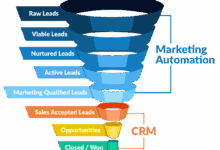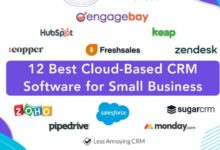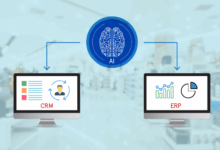Affordable CRM Software for Startups
Affordable CRM Software for Startups is crucial for early-stage businesses navigating limited budgets. Choosing the right system balances cost-effectiveness with essential features that drive growth. This guide explores various affordable CRM options, highlighting key features, integration capabilities, and long-term scalability considerations for startups.
We’ll delve into different pricing models, essential and desirable features, and popular CRM solutions tailored for startups. The importance of seamless integration with other business tools will be discussed, alongside practical implementation and training advice. Finally, we’ll examine how a well-chosen CRM can future-proof your business and contribute to improved sales and customer retention.
Defining “Affordable” for Startups
Affordability in CRM software for startups is a relative concept, heavily influenced by the company’s stage, budget, and specific needs. A system considered affordable for a bootstrapped startup with a small team might be far too basic or expensive for a rapidly growing company with significant funding. Understanding the factors contributing to affordability is crucial for making an informed decision.
Factors Influencing CRM Affordability for Startups
Several key factors determine the perceived affordability of a CRM system for a startup. Pricing models vary significantly, ranging from per-user monthly subscriptions to one-time purchases or tiered pricing based on features and user volume. The features offered are also a significant consideration; a comprehensive system with advanced automation and analytics will naturally be more expensive than a basic contact management tool. Finally, a startup’s unique requirements – the number of users, the complexity of sales processes, and the need for specific integrations – all play a role in determining the optimal (and therefore affordable) solution.
Pricing Models and Features
Different CRM providers offer various pricing tiers, each with a corresponding set of features. A typical structure might include a free or freemium plan with limited functionality, a basic paid plan for small teams, a professional plan with more advanced features, and an enterprise plan for larger organizations with extensive needs. For example, a basic plan might offer contact management, basic reporting, and limited email integration, while a professional plan might add features like sales pipeline management, marketing automation, and advanced analytics. Enterprise plans often include customizability, dedicated support, and robust API integrations.
CRM Pricing Comparison
The following table compares the pricing models of three popular CRM systems, highlighting their features, user limits, and notable integrations. Note that pricing can change, and these are examples based on typical offerings. Always check the vendor’s website for the most up-to-date information.
| Feature | HubSpot CRM | Zoho CRM | Salesforce Sales Cloud (Essentials) |
|---|---|---|---|
| Contact Management | Included in all plans | Included in all plans | Included |
| Deal/Pipeline Management | Included in all plans | Included in all plans | Included |
| Email Integration | Included in all plans | Included in all plans | Included |
| Marketing Automation | Available in paid plans | Available in paid plans | Available in higher tiers |
| Reporting & Analytics | Included in all plans (limited in free plan) | Included in all plans (limited in free plan) | Included |
| Pricing (per user/month, approximate) | Free (limited), Paid plans starting around $50 | Free (limited), Paid plans starting around $14 | $25 |
| User Limits | Varies by plan | Varies by plan | Varies by plan |
| Notable Integrations | Google Workspace, Slack, many others | Google Workspace, various apps via Zoho Marketplace | Various apps via AppExchange |
Essential Features for Startup CRMs
Choosing the right CRM is crucial for a startup’s success. A well-chosen system streamlines operations, improves team collaboration, and ultimately drives revenue growth. Focusing on essential features ensures you invest wisely without being overwhelmed by unnecessary complexity.
Startups often face limited resources, making it vital to select a CRM that provides maximum value at a minimum cost. Prioritizing core functionalities allows for efficient lead management, enhanced sales tracking, and improved customer relationships – all key components of early-stage growth.
Contact Management
Effective contact management is the bedrock of any successful CRM. This involves storing and organizing all customer-related information in a centralized, easily accessible database. This prevents data silos and ensures everyone on the team has the same up-to-date information. For example, a startup selling handcrafted jewelry might use this feature to track customer preferences (e.g., preferred metal types, gemstone choices), purchase history, and communication history. This allows for personalized marketing campaigns and improved customer service.
Lead Management
Lead management is critical for converting prospects into paying customers. A good CRM allows for lead scoring, prioritization, and tracking of interactions. This enables startups to focus their efforts on the most promising leads, maximizing conversion rates and resource allocation. Imagine a SaaS startup using lead scoring to identify high-potential customers based on website activity and engagement with marketing materials. The CRM would then automatically route these high-value leads to the sales team, ensuring timely follow-up.
Sales Pipeline Management
Visualizing the sales process is essential for identifying bottlenecks and optimizing sales strategies. A CRM with pipeline management features provides a clear overview of the sales journey, allowing startups to monitor progress, identify delays, and forecast revenue. A marketing agency could utilize this to track the progress of each client proposal, from initial contact to contract signing. This allows them to identify which stages of the process are most time-consuming and where improvements can be made.
Reporting and Analytics
Data-driven decision-making is crucial for startups. A CRM with robust reporting and analytics capabilities provides insights into sales performance, customer behavior, and marketing effectiveness. This allows startups to make informed adjustments to their strategies, improving efficiency and driving growth. For instance, an e-commerce startup could use reporting to identify its best-selling products, understand customer demographics, and optimize marketing campaigns based on real-time data.
Customer Communication
Maintaining consistent and effective communication with customers is paramount for building strong relationships and fostering loyalty. A CRM that integrates with email marketing and communication tools allows startups to personalize interactions, automate follow-ups, and provide excellent customer support. A food delivery service could use this to send automated order confirmations, delivery updates, and promotional offers, enhancing the customer experience and encouraging repeat business.
The following features, while not strictly essential, can significantly enhance the functionality and efficiency of a startup CRM:
- Task Management: Streamlines workflow and ensures accountability.
- Integration with other tools: Seamless connection with email, calendar, and other business applications.
- Automation: Automates repetitive tasks, freeing up time for more strategic activities.
- Customizable dashboards: Allows for personalized views of key metrics.
- Mobile accessibility: Provides access to CRM data anytime, anywhere.
Popular Affordable CRM Options
Choosing the right CRM for your startup can feel overwhelming, but focusing on affordability and essential features simplifies the process. Several excellent options offer robust functionality without breaking the bank. This section will explore three popular choices, comparing their features, pricing, and ease of use to help you make an informed decision.
Affordable CRM Software Comparison
This table compares three popular affordable CRM options: HubSpot CRM, Zoho CRM, and Bitrix24. Each offers a unique blend of features and pricing models, catering to different startup needs and growth stages.
| CRM Name | Key Features | Pricing | Pros/Cons |
|---|---|---|---|
| HubSpot CRM | Contact management, deal tracking, email marketing integration, live chat, reporting and analytics. Free plan available with paid options for advanced features. | Free plan; paid plans starting around $50/month for additional features and users. | Pros: Powerful free plan, excellent integration with other HubSpot tools, user-friendly interface. Cons: Limited features on the free plan, some advanced features can be expensive. |
| Zoho CRM | Contact management, lead management, sales pipeline management, marketing automation, customer support features, and integrations with other Zoho applications. | Free plan with limitations; paid plans starting around $14/month per user. | Pros: Comprehensive feature set, affordable paid plans, good customization options. Cons: Steeper learning curve than HubSpot, can feel overwhelming for very small teams. |
| Bitrix24 | Contact management, project management, task management, CRM, collaboration tools, social intranet, and website builder. | Free plan with limitations; paid plans offering more features and storage. Pricing varies based on the number of users and features selected. | Pros: All-in-one platform, robust collaboration tools, good for teams needing project management alongside CRM. Cons: Can be complex to navigate, free plan has significant limitations. |
Integration with Other Startup Tools
A robust CRM isn’t just a contact database; it’s the central hub of your startup’s customer interactions. Its effectiveness is significantly amplified when integrated with other essential business tools. Seamless data flow between these systems streamlines workflows, improves data accuracy, and ultimately boosts productivity. This integration avoids redundant data entry, minimizes human error, and provides a more holistic view of your customers.
Integrating your CRM with other tools provides a significant competitive advantage for startups. By connecting disparate systems, startups gain a unified view of their customers, leading to more effective marketing, sales, and customer service strategies. This interconnectedness allows for automated workflows, saving valuable time and resources.
Examples of Beneficial Integrations
The benefits of CRM integration are numerous, and selecting the right integrations depends on your startup’s specific needs. However, several integrations consistently prove invaluable. These integrations minimize manual data entry and streamline communication, improving overall efficiency.
- Email Marketing Platforms (e.g., Mailchimp, Constant Contact): Integrating your CRM with your email marketing platform allows for targeted email campaigns based on customer segmentation within the CRM. This enables personalized messaging and improved conversion rates. For example, you could automatically segment customers based on their purchase history and send tailored email promotions. This level of personalization is far more effective than generic blasts.
- Social Media Management Tools (e.g., Hootsuite, Buffer): Connecting your CRM to your social media tools allows you to track social media interactions and tie them directly to customer profiles. This provides a complete view of customer engagement across multiple channels. For instance, you could identify potential leads from social media and automatically add them to your CRM for follow-up.
- Payment Gateways (e.g., Stripe, PayPal): Integrating your CRM with your payment gateway provides real-time transaction data, offering valuable insights into customer purchasing behavior. This allows for more effective marketing strategies and improved customer service by identifying potential issues with payments quickly. Imagine automatically updating customer purchase history within the CRM immediately after a transaction is processed.
- E-commerce Platforms (e.g., Shopify, WooCommerce): This integration allows for seamless tracking of customer orders, purchases, and returns directly within your CRM. It provides a complete picture of the customer journey and facilitates proactive customer service. For example, you could automatically trigger a follow-up email after a customer’s first purchase or send a notification if there is a delay in shipping.
Improved Workflow Efficiency Through Seamless Integration
The primary benefit of integrating your CRM with other tools is the significant improvement in workflow efficiency. Automating previously manual tasks reduces the time spent on administrative duties, freeing up your team to focus on more strategic initiatives. This automation minimizes errors associated with manual data entry, leading to more accurate data and better decision-making.
For example, a startup using a CRM integrated with an email marketing platform and a payment gateway could automate the process of sending personalized thank-you emails after a purchase. This automated process would eliminate the need for manual data entry and ensure timely communication with customers, enhancing the overall customer experience. This level of automation not only saves time but also strengthens customer relationships.
Implementation and Training Considerations
Successfully implementing affordable CRM software requires a strategic approach that considers both the technical setup and the human element of training and ongoing support. A smooth transition minimizes disruption to your startup’s workflow and maximizes the benefits of the new system.
The typical implementation process for affordable CRM software usually begins with data migration. This involves transferring existing customer data from spreadsheets or legacy systems into the new CRM. Next, the system is configured to match your startup’s specific needs and workflows, including customizing fields, dashboards, and reporting features. Finally, user accounts are created and initial training is provided. The entire process can vary depending on the complexity of your data and the chosen CRM’s features, often taking anywhere from a few days to a few weeks. For example, a smaller startup using a simple CRM might complete implementation within a week, while a larger startup with extensive data might need several weeks.
Data Migration Strategies
Effective data migration is crucial for a successful CRM implementation. Poorly executed data migration can lead to data loss, inaccuracies, and significant delays. A phased approach, migrating data in segments rather than all at once, minimizes disruption and allows for error correction along the way. Data cleaning is also essential, ensuring accuracy and consistency before import. This may involve standardizing data formats, correcting inconsistencies, and removing duplicates. Finally, thorough data validation post-migration is vital to confirm data integrity and identify any issues that need addressing. Consider using a reputable data migration service if your internal resources are limited.
Effective Employee Training
Effective training ensures employees understand and utilize the CRM’s capabilities fully. A multi-faceted approach is recommended, combining different learning styles. This could include online tutorials, hands-on workshops, and one-on-one coaching sessions. Start with a comprehensive overview of the CRM’s core features and functionalities, followed by more specific training on tasks relevant to each employee’s role. Provide access to training materials, such as manuals and video guides, for future reference. Regular reinforcement sessions and ongoing support are also crucial to maintain user engagement and proficiency. Consider creating a user manual tailored to your startup’s specific workflow and processes.
User Support and Troubleshooting Resources
Most affordable CRM software providers offer various user support resources. These often include online help centers with FAQs, knowledge bases, and troubleshooting guides. Many also offer email or phone support, providing direct assistance from technical specialists. Some providers even offer live chat support for immediate assistance. Before selecting a CRM, carefully review the support options available and ensure they align with your startup’s needs and technical capabilities. Consider the provider’s reputation for responsive and helpful support. A strong support system can significantly reduce the time spent on troubleshooting and ensure efficient CRM usage.
Future-Proofing Your CRM Choice
Choosing a CRM for your startup isn’t just about addressing current needs; it’s about selecting a system that can adapt and scale as your business grows. A poorly chosen CRM can become a significant bottleneck as your company expands, leading to inefficiencies and potentially hindering your growth trajectory. Therefore, careful consideration of future scalability is crucial when making this important decision.
Selecting a CRM with the capacity to scale alongside your business involves evaluating several key aspects. This includes assessing the system’s ability to handle increasing amounts of data, the flexibility to integrate with new tools and platforms as your tech stack evolves, and the potential for customization to meet your evolving business processes. Ignoring these factors can lead to costly migrations and disruptions down the line.
Scalability and Data Handling Capacity
A scalable CRM should effortlessly manage growing volumes of customer data and interactions. Consider the CRM’s architecture – cloud-based solutions generally offer superior scalability compared to on-premise systems. Look for vendors who offer different service tiers or plans to accommodate expanding data storage needs and user accounts. For example, a startup might begin with a basic plan for a few users and a limited data storage capacity, but can seamlessly upgrade to a more robust plan as the team and customer base expand. This avoids the disruption of migrating to an entirely new platform later. A clear indication of scalability is the vendor’s transparency about pricing and capacity limits at each tier.
Integration Capabilities and API Access
As your startup grows, it’s likely you’ll integrate your CRM with other essential tools like marketing automation platforms, e-commerce systems, and accounting software. Prioritize CRMs with robust API (Application Programming Interface) access, allowing seamless data exchange between different applications. A well-designed API ensures that data flows smoothly across your tech stack, providing a unified view of your customer interactions and streamlining your business processes. Limited API access can significantly restrict your ability to customize and expand your CRM functionality as your business evolves. For instance, if you later decide to integrate with a specific marketing platform, the availability of a comprehensive API ensures smooth integration without significant technical hurdles.
Customization and Adaptability
Your business processes will likely evolve as your startup matures. Therefore, choose a CRM that offers customization options to adapt to these changes. This could involve workflow automation, custom fields, and reporting capabilities. A highly configurable CRM allows you to tailor the system to your specific needs without relying on costly and time-consuming custom development. For example, you might need to add custom fields to track specific customer attributes relevant to your industry or modify workflows to reflect changes in your sales process. A flexible CRM allows for these adaptations without needing to replace the entire system.
Long-Term Cost-Effectiveness
While the initial cost of a CRM is important, it’s crucial to evaluate the long-term cost-effectiveness. Factor in potential upgrade costs, implementation fees, ongoing maintenance, and the cost of training. A seemingly inexpensive CRM with limited scalability might end up costing more in the long run due to the need for frequent upgrades or even a complete system replacement. Compare the total cost of ownership (TCO) of different CRM options over a period of several years, considering anticipated growth and the need for additional features or support. This approach provides a more holistic view of the financial implications of your CRM choice.
Illustrating CRM Benefits for Startups
Implementing a CRM system offers significant advantages for startups, streamlining operations and fostering growth. By centralizing customer information and automating processes, a CRM empowers startups to improve sales conversion rates and cultivate stronger customer relationships, ultimately leading to increased profitability and sustainability. The following examples illustrate these key benefits.
Improved Sales Conversion Rates: A Before-and-After Scenario
Imagine a young tech startup, “Innovate Solutions,” launching a new productivity app. Before implementing a CRM, their sales process was chaotic. Sales leads were scattered across spreadsheets, emails, and sticky notes. Sales representatives lacked a unified view of customer interactions, leading to inconsistent messaging and missed opportunities. This resulted in a low sales conversion rate of approximately 10%. The sales funnel depicted this as a wide top (many leads entering) tapering sharply to a narrow bottom (few sales closing).
After implementing a CRM, Innovate Solutions centralized all customer data. Sales representatives gained a 360-degree view of each lead, including past interactions, communication preferences, and deal stage. Automated workflows triggered timely follow-ups and personalized communications. The result? A significant increase in sales conversion rate to 25%, depicted as a funnel with a similar wide top but a much wider bottom, indicating a higher percentage of leads successfully converting into sales. This improvement is attributed to better lead qualification, targeted messaging, and efficient follow-up processes facilitated by the CRM.
Enhanced Customer Relationship Management and Boosted Customer Retention
Consider another startup, “EcoFriendly Goods,” selling sustainable lifestyle products online. Before using a CRM, customer service was reactive and fragmented. Customer inquiries were handled through various channels (email, social media, phone), leading to inconsistent responses and a lack of personalized attention. Customer retention was low, with a high churn rate. A visual representation would show scattered data points representing customer interactions across different channels, lacking a unified view and showing a high rate of customer churn.
With a CRM, EcoFriendly Goods consolidated all customer interactions into a single platform. This enabled them to track customer preferences, purchase history, and support interactions, providing a holistic view of each customer. Automated email sequences for onboarding and follow-up improved customer engagement. Personalized recommendations based on purchase history increased customer satisfaction. The visual representation after CRM implementation would show a centralized network of connected data points, representing improved customer engagement and a reduced churn rate. This resulted in a significant increase in customer lifetime value and a much improved customer retention rate. The improved customer relationships fostered loyalty and positive word-of-mouth referrals, further contributing to business growth.
Ultimate Conclusion
Selecting the right affordable CRM is a pivotal decision for startups. By carefully considering factors like pricing models, essential features, integration capabilities, and scalability, startups can leverage CRM technology to streamline operations, enhance customer relationships, and ultimately, drive significant business growth. Remember to prioritize features that align with your current needs while selecting a system capable of adapting to your evolving business requirements.





